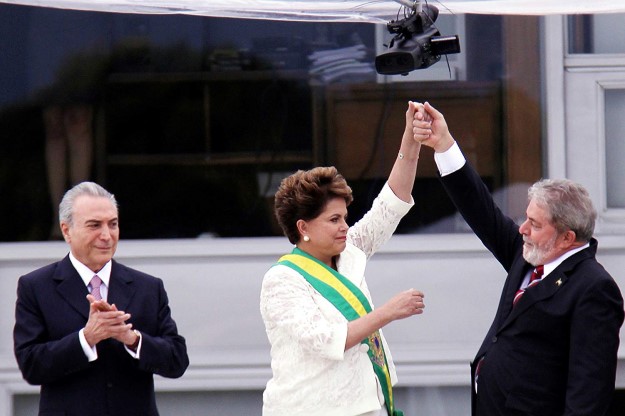The Brazil of the 2010s is a six-hundred-and-thirty-three-act Greek tragedy with plot twists so insanely complicated that it’s hard to even find a common language to discuss it. “Impeachment” or “coup”? #LulaStayInJail or #LulaPoliticalPrisoner? The Edge of Democracy, the new Netflix documentary by Petra Costa, deals with this by picking a side – the left – and (mostly) sticking with it. Despite the resulting biases and omissions, it is one of the best-produced, most thoughtful accounts we’re likely to get of the decade that saw Brazil’s dreams of prosperity and global power disappear in a cloud of green, yellow and blue (and red) smoke.
Many have commented on the extraordinary access Costa obtained, which shows even veteran Brazil observers a new side of familiar personalities. Perhaps the biggest revelation is Dilma Rousseff, who went from one of the world’s most popular presidents (74% approval) in 2013 to impeachment (a term that I suppose shows my own bias) three short years later. I covered Rousseff as a reporter for five years, and always heard unconfirmed rumors she was more than the gruff micromanager notorious for making her aides cry and mangling the Portuguese language – as the economy began to sink and eventually capsized under her watch. In the film, Rousseff confronts her fate, which she and others recognize is unavoidable, with immense dignity, gallows humor and barely suppressed moral outrage. Her frank admission that “I didn’t govern in 2015” is a reminder of just how long Brazilian politics has been characterized by a dearth of quality leadership and the conflicts among the three branches of government that continue to paralyze the country today, even with Rousseff long gone.
The film’s other main figure is Luiz Inácio Lula da Silva, whose mercurial path parallels the author’s story of Brazilian democracy since its rebirth in 1985. Indeed, it truly is amazing the extent to which the last 30 (perhaps 40) years can be seen as one giant Lula psychodrama – in which virtually everyone and everything is defined by support for or opposition against the uber-charismatic former union leader. Lula is here in full relief, urging distraught supporters not to cry, preparing to sleep on a mattress on the floor on his final night outside prison, strategizing and conniving and gnashing his teeth at his failure to dismantle the “nine families who control the media in Brazil” while still in office. He comes across as brilliant, erudite, utterly manipulative – the most talented politician of his generation. A criminal? The courts say so. But those who still insist on calling Lula “illiterate” or “dumb” are guilty of the worst kind of Brazilian class-ism, as this film once again makes clear.
That these are by far the film’s two biggest protagonists makes narrative sense – but also shows its shortcomings. No reasonable figure from Brazil’s center or center-right (yes, they exist) appears at any length. The economic collapse that, more than anything else, ended the Workers’ Party’s 13-year run is portrayed in simplistic, conspiratorial terms – “The Market” is cast as a cartoon villain, turning on Rousseff shortly after she criticizes high interest rates (thus threatening their profits), and then leaning on Brazil’s pliant corporate media to conjure up widespread popular rage. Is there a bit of truth here? Yes. But little mention is made of the collapse of global commodities prices after 2012, or Rousseff’s constant meddling in energy prices, infrastructure projects and tax breaks that did so much to scare away investment and trash Brazil’s finances. Guido Mantega, her disastrous long-time finance minister, doesn’t appear at all. On the question of the so-called pedaladas, the pretext for Rousseff’s impeachment, this is – again – where the language one uses is so important. If you say she was ousted for fiscal accounting measures employed by every other recent Brazilian government, you might be tempted to say it was a “coup.” But if you say her government massively disguised the true size of the deficit so she could get reelected, and then went effectively broke shortly thereafter… suddenly “impeachment” doesn’t sound so unreasonable.
The other main theme in the film is criminality – and here, Costa is on more solid ground. Almost everybody we see in Brasília is on the take, conspiring and/or imminently bound for jail, a portrayal that is sadly accurate. Whether Lula himself is among the guilty, Costa effectively demurs. What seems to interest her more is how his behavior fits in with the broader structures of Brazil’s hard-won but flawed democracy. In her telling, Lula is a tragic hero who was induced to participate in centuries-old corrupt practices in order to advance his inclusive agenda, which successfully lifted 30 million people from poverty. Here, I agree with her, with an addendum: that the Workers’ Party’s version of “The Mechanism” was super-charged by the commodities boom, and co-existed with the party’s efforts to improve and bolster the Brazilian judicial system, a contradiction that was unsustainable, and ended in tears. The ultimate result was, as Costa rightly notes, the implosion of Brazil’s political establishment, the election of a dictatorship apologist as president – and a democracy that in 2019 is very much on “the edge.”









